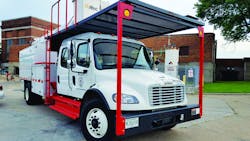We’ve all heard the phrase “farm to table.” How about “stovetop to vehicle”? That’s the process being used by the Chicago Park District (CPD) these days. There are a few more steps in the process, of course, but 56 units in the department’s fleet of 550 vehicles are using a biodiesel blend up to B50 (50% biodiesel) made from used cooking oil.
“We made the move to clean-burning biodiesel fuel a few years ago,” says Michael Dimitroff, manager of art initiatives, Dept. of Cultural and Natural Resources for the Chicago Park District, a member of Chicago Area Clean Cities. “It has been paying off from the start, helping us to reduce vehicle emissions and save fuel as well as save thousands of dollars annually on the cost of fuel.”
The Park District is also a member of The B20 Club, a checkoff-funded program jointly sponsored by the Illinois Soybean Assn. and the American Lung Assn. in Illinois that recognizes Illinois-based fleets running on biodiesel blends of 20%. The fleet has nearly 200 vehicles, ranging from lawn mowers to garbage trucks, using some concentration of biodiesel from B10 up through B50. The Park District consumes 8,700 gals. of ASTM-certified biodiesel.
The cooking oil is collected from restaurants, such as Portillo’s in Chicago, a major chain of restaurants; sports venues, such as U.S. Cellular Field and the United Center; and special events, such as the Taste of Chicago.
The program is a public/private partnership with Darling International, Renewable Energy Group (REG), and the Chicago Park District. Texas-based Darling collects and recycles used restaurant cooking oil and by-products from beef, pork, and poultry processing industries. Darling makes a yearly donation of feedstock to the Chicago Park District. REG then converts the feedstock to biodiesel in its Danville, IL, facility and sends it to the Park District’s fueling site for fleet usage. The biodiesel meets the BQ-9000 certification.
The Park District took advantage of an underutilized fleet fueling site in 2011, converting it to enable biodiesel blending. Chicago-based Indigenous Energy oversees the biodiesel program.
“We ensure a seamless integration of high blends of biodiesel by maintaining fuel integrity and closely monitoring the health of the fleet,” says Pete Probst, director of research and development at Indigenous Energy. “CPD stores the biodiesel in underground tanks and directly fuels its fleet from the blending dispenser. It uses the CPD tanker truck to fuel vehicles at other locations throughout the city.”
The Chicago Park District’s fleet includes 80 additional vehicles that use E85 fuel, more than 50 hybrid-electric vehicles, and 12 that use clean-burning compressed natural gas.
“The benefits of using renewable fuels and electric vehicles include reducing greenhouse-gas emissions, decreasing vehicle emissions, lowering demand for fossil fuels, and increasing demand for domestic based fuels,” says Dimitroff. “We’re also proud that the Chicago Park District has become a benchmark for other municipalities and fleets that want to go green with their fleets.”
